This story has been corrected. Read below for details
The situation with the National Football League is a lot worse than people realize, and the only one who seems to grasp this fully is commissioner Roger Goodell. You don't issue emergency orders backed by threats, as Goodell just did regarding the New England Patriots' files of cheating information, unless the situation is a lot worse than people realize.
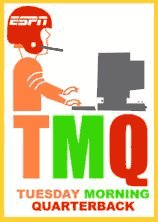
Think the NFL can't decline? Fifteen years ago, the National Basketball Association was going up, up, up by every measure and was widely considered the gold-plated can't-miss "sport of the next century." Since then, NBA popularity and ratings have plummeted while NBA-based teams have floundered in international competition. At the moment of its maximum success, the NBA became overconfident and arrogant in ways that need not be recounted here. Key point: There was no law of nature that said the NBA had to stay popular, and it did not.
Today the NFL is king of the hill in sports status, ratings, merchandising and association with the American psyche. There is no law of nature that says the NFL has to stay popular. Overconfidence and arrogance could be the downfall of the NFL, too – and we might be on that precipice. People will always watch and play football, of course. But nothing guarantees that the NFL's version of football must remain the super-successful money machine that it is today. There could be autumn Sunday afternoons in the near future in which the overwhelming majority of Americans couldn't care less what NFL games are being shown. Fifteen years ago, sports-marketing types would have said "impossible!" to the notion that only 11 percent of American households would watch the NBA Finals, which is what happened this June. Plummeting popularity for NFL broadcasts seems "impossible!" right now, but might happen fast enough to make your head swim.
Criminal behavior by NFL players, haughty owners who demand public subsidies, negative press for the union, coaches who snarl at the public instead of acting grateful for their privileged positions, insufferable egotism from multimillionaire athletes: All these things can be overlooked as long as the games themselves are good. If the games themselves are tainted, the NFL could tumble with amazing speed. And now there is a cheating scandal – cheating by the team that presented itself as the epitome of the sport – which calls the games themselves into question.
| TMQ Cheat Sheet |
|---|
|
Gregg Easterbrook on ...
• Stats of the week • Cheerleader of the week • Sweet/sour plays of the week • Buck-Buck-Brawckkkkkkk • Wacky food of the week • San Diego at New England • Oh ye of little MPG • Rule change needed • Wide receiver runaway egos • Leftover Beli-Cheat point |
First we learn that the Patriots were cheating by using video equipment to steal signs, in blatant violation of league rules. Then we learn that even after the scandal broke and Bill Belichick issued his Nixonian stonewalling statement, the Patriots were still keeping sign-stealing videotapes and notes from past games. Surrender of the tapes and notes was the subject of Goodell's emergency order, first reported by ESPN's Chris Mortensen. Sunday night on NBC's "Football Night in America," Goodell threatened more punishment of the Patriots if all cheating materials aren't surrendered, and repeatedly declared it was imperative that NFL games be fair and equal competition. That's exactly the crux of the threat Belichick has created to the league's golden goose.
Consider the Sunday night contest. New England had played San Diego just four games back, in the January 2007 postseason. Perhaps Belichick's cameraman was illegally taping the Chargers that day, and perhaps Belichick illegally used the information against the Chargers on Sunday night. The San Diego coaching staff has changed since the playoff game, so presumably its defensive calls are different. But San Diego's new defensive coordinator, Ted Cottrell, was defensive coordinator for the Bills and Jets, both AFC East teams, in the Belichick period. Perhaps Belichick has spied on Cottrell's calls before and took out the tapes of the spying rather than handing them over as Goodell demanded. Was New England cheating again Sunday night, when the Patriots advanced the ball with such ease it seemed they knew what defense San Diego would be in?
And the Patriots' cheating might have been more extensive than so far confirmed. Fox Sports reported that former NFL players believe Belichick had microphones installed in the shoulder pads of defensive linemen so the Patriots could tape other teams' offensive audibles and line calls. Needless to say, putting microphones on players violates NFL rules. Andrea Kremer of NBC reported that several teams might charge the Patriots this week with having stolen playbooks from the visitors' dressing room. The convenient "malfunction" of visiting teams' headphones at the Patriots' two fields under Belichick seems to have happened far too often to be an IT department error. The rumor mill says Belichick, Richard Nixon-style, has file cabinets of info on opposing coaches and assistant coaches – some gleaned honestly, some obtained by cheating.
It seems more than just an eerie coincidence that Belichick's unethical behavior involves illicit taping, the same offense that made Nixon's actions so sordid. The parallels to Nixon don't stop there. Caught, Belichick – like Nixon – tried to hide the true extent of the prohibited acts; Belichick – like Nixon – tried to claim his prohibited action hadn't been prohibited; Belichick – like Nixon – immediately stonewalled. It would be tempting to break the unhappy tone of this column with a Nixon joke – when the league plays Belichick's tape of the Jets' sideline, will there be an 18-and-a-half minute gap? But for all lovers of the NFL, there's just nothing to laugh about now.
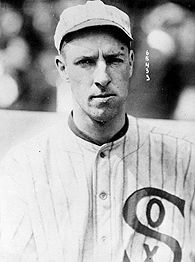
AP Photo
The Patriots announced they have hired "Swede" Risberg to investigate cheating allegations against the team.
The weasel wording of Belichick's Nixonian statement shows the New England coach full of contempt for the NFL fans, and the NFL enterprise, that made him a wealthy celebrity. Belichick declared that his super-elaborate cheating system was only a "mistake" caused by his "interpretation" of the league's rule. Wait, "interpretation"? The NFL rule bans teams from filming each other's sidelines. There's no room for interpretation, it's a ban! Here's the NFL policy, from a memo sent to all head coaches and general managers Sept. 6, 2006: "Videotaping of any type, including but not limited to taping of an opponent's offensive or defensive signals, is prohibited on the sidelines, in the coaches' booth, in the locker room or at any other locations accessible to club staff members during the game." Prohibited. There's nothing there to "interpret." Videotaping opponent's signals even after getting this warning isn't a "mistake," it's cheating. Belichick's cheating was not some casual spur-of-the-moment blunder but rather an elaborate staffed system that took a lot of work to put into place and that Belichick worked hard to hide. And you don't hide something unless you are ashamed of it.
Michael Vick tried to deny and stonewall, but at the last owned up and admitted what he did. That's dignity. Belichick is now using weasel words to deny responsibility for his own choices. What kind of example does that set for the young? "Make good choices," football coaches constantly preach to the young. Now, caught, Belichick wants a special exemption to responsibility for his own choices. Belichick also is trying to close the matter by saying he won't talk about it anymore. So he cheated and now unilaterally declares the matter closed because he doesn't want to face the consequences of his own choices. But this is not over and not going away. Before the cheating scandal, Belichick had a reputation for being heartless but a really good coach. Now, he seems little more than a creepy con artist, and it's the refusal to act like a man and take full responsibility that's really offensive. Goodell's draft-choice penalty against the Patriots – either a first or a second and a third – is the highest draft penalty ever imposed in the NFL. The severity of this sanction shows how seriously Goodell takes the violation. If more disclosures are coming, there might be a lot more punishment of the Patriots. And unless Belichick comes clean and stops lying about his cheating, this event should disqualify him from consideration for the Pro Football Hall of Fame – it is, after all, not the Hall of Cheaters.
 Will Belichick even be in coaching by season's end? When the Vick dogfighting scandal first broke, most football pundits, and most in the Atlanta and league offices, thought there would be few repercussions. Then they thought Vick would have to make some kind of apology. Then they thought he'd need some leave of absence. Then they thought he'd be suspended for a year. Now they wonder whether he'll ever be allowed to play again. By acting Nixonian, Belichick is accelerating his fall from grace. Today, Belichick and New England are trying to pretend the scandal is over. It would not surprise me in the slightest if, before the season ends, Belichick resigns, or is suspended, or is fired by Kraft, or even is permanently barred from the league. Belichick's head might be necessary to preserve the integrity of the game. Surprisingly soon, sacrificing Belichick to save professional football might seem an attractive option, even to Kraft. Remember, there is no law of nature that says the NFL must remain popular.
Will Belichick even be in coaching by season's end? When the Vick dogfighting scandal first broke, most football pundits, and most in the Atlanta and league offices, thought there would be few repercussions. Then they thought Vick would have to make some kind of apology. Then they thought he'd need some leave of absence. Then they thought he'd be suspended for a year. Now they wonder whether he'll ever be allowed to play again. By acting Nixonian, Belichick is accelerating his fall from grace. Today, Belichick and New England are trying to pretend the scandal is over. It would not surprise me in the slightest if, before the season ends, Belichick resigns, or is suspended, or is fired by Kraft, or even is permanently barred from the league. Belichick's head might be necessary to preserve the integrity of the game. Surprisingly soon, sacrificing Belichick to save professional football might seem an attractive option, even to Kraft. Remember, there is no law of nature that says the NFL must remain popular.
And in other football news, I don't wish to alarm anyone – but next week's Indianapolis at Houston matchup is a monster contest!
Stat of the Week No. 1: Stretching back to last season, Green Bay has won six consecutive games.
Stat of the Week No. 2: Defending NFC champion Chicago has two touchdowns this season – one by a punt returner and one by an offensive lineman.
Stat of the Week No. 3: Stretching back to last season, New Orleans has lost five of seven. In its past three games, New Orleans has been outscored 38-113.
Stat of the Week No. 4: Stretching back to last season, the Giants have lost nine of their last 11.
Stat of the Week No. 5: There were 11 touchdown passes in the Cincinnati-Cleveland game.
Stat of the Week No. 6: There were 10 turnovers in the Detroit-Minnesota game.
Stat of the Week No. 7: Running plays on second-and-1, second-and-1, second-and-2, third-and-1, third-and-2, fourth-and-2 and fourth-and-2, the Bills gained a combined zero yards.
Stat of the Week No. 8: Atlanta, which averaged 2 sacks allowed per game last season with Michael Vick at quarterback, has allowed 13 sacks in its first two games.
Stat of the Week No. 9: Cincinnati gained 531 yards, scored 45 points – and lost.
Stat of the Week No. 10: San Francisco is last in the NFL in offense – and undefeated.

Philadelphia Eagles
The Eagles cheerleaders gave it their all on Monday night -- too bad the Eagles didn't.
Now is the offseason of our discontent
Made glorious summer by our two-piece outfits.
Our bruised ribs and ACLs have been treated
Our stern sternums taped for merry tackling.
Game plans have we laid, player introductions dangerous
Before drunken fans and libeling sportscasters.
Fly, Eagles, fly you now!
Sweet Play of the Week: Game scoreless, Chicago lined up at the Kansas City goal line in an old-fashioned wing T, with three backs in the backfield and an extra offensive lineman reporting eligible as a tight end. Bears in the wing-T -- there's a welcome flashback antidote to shotgun spread mania! Play fake and touchdown pass to extra offensive lineman John St. Clair, who mimed a block, then jogged, uncovered, into the corner of the end zone.
Sweet Play of the Week No. 2: On the Adalius Thomas interception touchdown against San Diego, the Bolts faced third-and-2 and lined up in a pass-wacky set despite having the league's best power-rush offense in 2006. The Flying Elvii lined up in a rare "stack I" defense, with two middle linebackers directly behind each other, Thomas behind Larry Izzo. I've often wondered why teams don't go stack-I on defense at least occasionally. Rivers seemed not to know Thomas was there. The Patriots blitzed; predictably, the Chargers ran a short curl as a "hot read" pattern; Thomas ran backward to where the curl man would be and Rivers threw directly to him.
Sour Play of the Week: With Dallas leading 10-3, Miami made a first down at the Cowboys' 25 with 25 seconds remaining in the first half and, out of timeouts, rushed to spike the ball. Trent Green so badly botched the spike motion that it ended up as a fumble. Green had to cover the ball; the Dolphins furiously lined up for another spike. The botched spike cost Miami precious seconds and a down. The Marine Mammals ended up kicking a field goal, making the halftime score 10-6 rather than, possibly, 10-10. Dallas later pulled away to win 37-20.
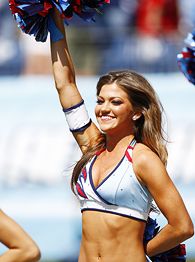
G. Newman Lowrance/Getty Images
For the next home game the Titans' cheer-babes should chant, "THROW DOWN THE MIDDLE! THROW DOWN THE MIDDLE!"

AP Photo/Nick Ut
A merry mid-September street scene.
Buck-Buck-Brawckkkkkkk: Jersey/B made a nice comeback against the rugged Baltimore defense, but the comeback was doomed in this wise. Trailing 20-3 with 10:08 remaining, the Jets faced fourth-and-goal on the Ravens' 3. Eric "Double Agent" Mangini took the field goal. Yes, down by 17 you need three scores. But two must be touchdowns, and here you are just 3 yards away! At the endgame, with a minute to play, Jersey/B had first-and-goal on the Baltimore 7, trailing 20-13, and threw desperate passes until the icing interception for the Nevermores. Had the Jets gone for the touchdown earlier and succeeded, at the endgame they could have kicked a field goal and caused overtime. Law of the Obvious note: Leading 20-13, Baltimore took possession on its 33 with 3:12 and proceeded to go three-and-out, stopping the clock twice with incompletions. Had the Ravens simply run into the line for no gain on both those downs, the Jets might not have had time to make the ending interesting.
Buck-Buck-Brawckkkkkkk No. 2: Trailing 23-13 with 9:26 remaining in the game, Miami faced fourth-and-4, and coach Cam "Cam" Cameron ordered a punt. As TMQ noted two weeks ago, teams that punt on fourth-and-short when trailing in the fourth quarter almost invariably go on to lose, as Miami did. Trailing by two scores in the fourth quarter -- why are you punting???????
U B the Coach (New Item): Trailing San Francisco 17-16, St. Louis faced fourth-and-7 on its 43 with 2:40 remaining, holding two timeouts. Scott Linehan went for it, incompletion. The Niners soon punted the ball back, and now St. Louis faces fourth-and-3 on the San Francisco 38 with 1:04 remaining, score still 17-16. That's a mighty long field goal attempt, though with a good kicker in a dome, versus a solid chance for a first down because the Rams average about 5 yards per play. Kick long to win, or go for it to get closer? U B the coach.
AccuScore Speaks! (New Item): This season, the stats-analysis service AccuScore, which has a fantastic track record, will be contributing occasional data bursts to TMQ. On Thursday, AccuScore sent me a memo on the upcoming San Diego at New England headliner game. The memo's title: "Patriots Should Pass, Pass, Pass." Owing to San Diego's superior run defense and New England's superior pass blocking, AccuScore game simulations showed the Patriots with a 60 percent chance of winning if they used the average of their recent play-calling strategy, rising to a 66 percent chance of winning if New England went pass-wacky. Sure enough, New England passed on its first 10 consecutive snaps; New England coaches called passes (attempts or sacks) on 18 of the first 29 snaps. After that pass-wacky start, New England led 17-0 and never looked back. AccuScore has not stolen any San Diego signals -- it figured this out the old-fashioned way. So why did the Chargers seem so surprised when New England opened with pass, pass, pass?
Scouts' Notes (New Item): Boy, Jeff Garcia looked good as the Bucs stepped all over the collapsing Saints. TMQ's scouting department noted that when Garcia intends to throw long, he drops way back, noticeably farther than normal. And boy, Peyton Manning looked human against the Tennessee Titans -- is the Super Bowl MVP up for the challenge of facing the Houston Texans? In the Tennessee game, Manning either play-faked or pump-faked on almost every pass attempt. Peyton play-fakes and pump-fakes more than any other quarterback in the league, and his success indicates other teams should increase their rates of play fakes and pump fakes. But if Peyton starts using these moves constantly, won't their value wear off?
Briscoe High to Wear White on Road: In light of the terrible injury suffered by Kevin Everett of the Bills during a helmet hit, check these offseason announcements from the National Federation of State High School Associations (NFHS), the rule-making body for most high school sports. Last winter, the NFHS was worried about helmet hits and use of the helmet as a weapon. Under the new rules, high school restrictions against blows using the helmet are really strict: You're going to see boys ejected from games in 2007 for actions that previously would only have drawn a flag, or even been legal. How about it NCAA and NFL, why not make your helmet-hits rules stricter too?
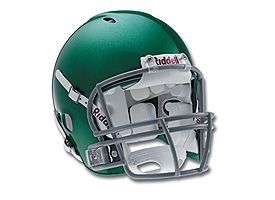
Riddell
The Riddell Revolution anti-concussion helmet -- why doesn't the NFL set a good example by making it mandatory?
Two other NFHS notes. First, starting in 2012, high school uniform looks will be standardized -- the home team will be required to wear a colored jersey and the visiting team required to wear whites. Alternative uniforms have reached down even to the high school ranks, and they have been causing confusion. Second, the NFHS annually reports on participation in prep athletics. Check the latest: "In terms of the number of participants, football is the most popular high school sport for boys. According to the 2005-06 NFHS High School Athletics Participation Survey, 1,071,775 boys played 11-player football, with another 25,000 involved in six-, eight- and nine-player football. In addition, 1,264 girls played high school football in 2005-06." Girls, if you want to try out for your high school football team, you might not make it, but you're not weird. Female participation in high school football is rising.
Head-Scratcher of the Week: "Eli Manning is really showing today that he has become a leader," Howie Long said on Fox, halfway through the Giants' ninth loss in their past 11 games.

AP Photo/Jeff Gentner
"How do you like your goat cheese snow?"
Official Brother Frank Easterbrook, a habitué of fine Chicago restaurants, reports that Moto has been surpassed in price, absurdity and difficulty of obtaining reservations by Alinea, which charges $195 a head for a menu that includes "frozen and chewy" strawberries. All this nonsense began with El Bulli in Spain, which has won several world's best restaurant awards and is where Euro-trendies expend about $300 a head for an evening of such delicacies as seaweed omelet in a martini glass. El Bulli's Web site -- which has links that are impossible to copy -- declares "a new way of serving food" in which "diners themselves participate in the process." Are there restaurants where the diners don't participate? Also, the El Bulli Web site announces that "Decontextualization, irony, spectacle, performance are completely legitimate, as long as they are not superficial but respond to, or are closely bound up with, a process of gastronomic reflection."
San Diego at New England Analysis: Patriots players wanted to win emphatically so they could pronounce, "Nobody can say we cheated in that game." Win emphatically they did. What in blazes was the story with the Chargers? Rarely has a quality team seemed so ill-prepared for a monster game, and rarely has a quality team seemed to give up the moment the going got tough.
Consider the first New England possession. San Diego's rush defense is much better than its pass defense, so you don't need to be wiretapping the other coach's radio, or even know about AccuScore, to suspect the Flying Elvii will come out passing. Yet after New England had thrown on its first six snaps, San Diego still seemed surprised when New England threw on its seventh snap -- tight end Ben Watson ran a simple down-and-out and no Chargers defender covered him. You can't be any more open than not covered at all. Now it's the second New England possession, and the Pats have thrown on 13 of their first 19 snaps. San Diego still seemed surprised when Brady threw deep to Randy Moss -- the dominant New England offensive player of the previous week's game. All Moss did was run a simple "up" against Chargers' corner Quentin Jammer, who looked surprised Moss was going deep. Brady pump-faked left, and Jammer and the San Diego safeties immediately seemed to decide that meant he could not throw right, to Moss. That's awful defense.
On Moss' second touchdown, New England put offensive lineman Ryan O'Callaghan in as a blocking back reporting eligible, as it had three previous times in the game. San Diego defenders seemed to assume this meant the Patriots would run -- although Brady already had play-faked and thrown with O'Callaghan in the backfield. All Moss did was run a simple "up" against Chargers' corner Drayton Florence, who ignored Randy Moss and instead stood "looking into the backfield," trying to guess the play. As Moss caught the touchdown pass that iced the game at 31-7, Florence was way out of position and no safety was anywhere in the television tetragon. Moss had dominated in Week 1 and already had scored a touchdown against the Chargers -- yet the San Diego defense ignored him. That's awful defense.
But what was really awful about San Diego's performance was the coaching timidity. With New England leading 17-0, San Diego faced fourth-and-1 on its 39. Norv Turner, no matter how bad your career record is (now 60-84-1), you cannot, you just cannot be sending in the punt unit on fourth-and-1 near midfield when trailing by three scores! As the punt boomed TMQ wrote the words "game over" in his notebook -- with 8:16 remaining in the first half. San Diego got the ball back, and the football gods, outraged, caused Philip Rivers' pass to be intercepted by Adalius Thomas and returned for a touchdown. After the kickoff, San Diego faced fourth-and-2 at midfield with 2:49 remaining, trailing 24-0. Again Turner punted. When the coach quits on the game in the second quarter, it should come as no surprise that the players quit.
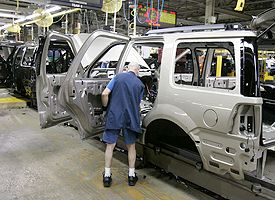
AP Photo/Carlos Osorio
George W. Bush and Barack Obama agree on the need for higher MPG -- why is Congress afraid to act?
The National Academy of Sciences said in 2002 that a one-third improvement in mpg is practical using existing technology, and without sacrifice of safety or passenger comfort. Now, the U.S. automakers claim a one-third improvement can't be done. It's not that Detroit cannot achieve better fuel economy -- it's that Detroit doesn't want to. What the current executive-suite suits at the Big Three want is to maximize their bonuses and stock options during their short stays at the top, then let somebody else take the blame for the next round of decline of the U.S. auto industry that is inevitable if fuel economy does not improve. And that's setting aside the national-security implications. A one-third increase in car and SUV mpg is what's needed to break U.S. dependence on Persian Gulf oil. Wouldn't it be nice if Detroit CEOs acted as though they cared about national security!
This summer, the Senate passed something that on paper seemed even better than the Bush-Obama plan, ordering a 40 percent mpg improvement by 2020; the House has yet to act. But although the Bush-Obama plan had teeth, specifying that carmakers show annual mpg improvement beginning immediately, the Senate provision contained a huge asterisk: There are no annual milestones, just a requirement that the mpg rise be accomplished by 2020. That gives Detroit the green light to spend most of the next 13 years doing nothing about petroleum waste, and there is no endeavor in which American automakers are more accomplished than doing nothing about petroleum waste. Plus, the Senate bill contains a waiver provision -- as the 2020 deadline approaches, automakers can request a waiver. Thus the Senate mpg bill, widely praised by gullible editorialists, actually is pure froth.
Now remember that little phrase, "the House has yet to act." Speaker Nancy Pelosi, who boasts about how she will take the bold steps the president will not, won't allow a floor vote on any mileage provision. Pelosi says new mpg rules can be negotiated in conference committee -- that is, in secret, with no public disclosure. And she hasn't even scheduled a conference. George W. Bush proposed a strong, binding program of immediate mpg increases, and Democrats in the House refuse to allow an up-or-down public vote. The calculus is that Pelosi wants to prevent any kind of reform from passing so that, in the 2008 presidential election, Democrats can denounce Republicans for lack of progress on mpg. Wouldn't it be nice if House Democrats acted as though they cared about national security!
While the Senate was considering mpg rules, the Alliance of Automobile Manufacturers, a mostly Detroit-run lobby group, aired radio ads that were monuments to deceit. Two women were heard discussing how new mpg regulations could "force" automakers to "put safety in the back seat." One said, "I want to keep my SUV because it makes me feel safe." Several senators speaking against the tough Bush-Obama version of the mileage rules declared that higher mpg would imperil lives by replacing safe large SUVs with small cars. But the Bush-Obama proposal would not require automakers to reduce the size or weight of passenger vehicles. Fuel economy could be improved through engineering changes including reducing horsepower, which many vehicles presently have too much of anyway; the new Acura TL has an absurd 286 horsepower in a midsized sedan, showing that even former good-guy Honda has abandoned corporate responsibility regarding horsepower. Reducing the horsepower of new vehicles would reduce crash rates, thus improving safety.
And although being in a heavy SUV might make the driver feel safer, the reality is the opposite. The Insurance Institute for Highway Safety continues to find that you are more likely to die in an SUV than in a regular car. In its most recent study, "very large" SUVs had a higher occupant death rate than midsized cars -- that is, trading in your large SUV for a regular-size car makes you less likely to die. The IIHS also finds that econobox-sized cars are death traps in crashes, so don't switch to a tiny car to save fuel, switch to a midsized vehicle with a middling-horsepower engine. Here are the most recent National Highway Traffic Safety Administration figures on fatality rates by vehicle class. They show that people in "light trucks," the class that enfolds SUVs and most pickup trucks, are roughly one-third more likely to die per mile traveled than people in regular-size cars. It was quite cynical for the Alliance of Automobile Manufacturers to tell consumers that SUVs will make them feel safe when statistics show that buying an SUV makes the driver more likely to die.
Not only has it been nearly two decades since the average fuel economy of new vehicles sold in the United States improved -- the sad story is here -- but the EPA continues to publish Pollyannaish statistics that make it seem as though American vehicles burn less fuel than they actually do. According to the EPA figures used to enforce the federal Corporate Average Fuel Economy standard, this year's new cars average 27.5 miles per gallon and new SUVs average 21.6. Is there one single person in the United States whose SUV gets 21.6 mpg? There can't be many regular cars that actually get 27.5 mpg, either. Researchers have long complained that claimed EPA averages are unrealistic -- vehicles tested using gentle acceleration with air conditioners off, with no weight onboard, and employing other gimmicks to make fuel consumption appear lower. Surely government-issued unrealistic mpg figures are a leading reason for years of national complacency about petroleum use. People go into auto showrooms and see impressive-looking government window stickers declaring that cars get 28 mpg and SUVs get 22 mpg. People think, "That's pretty good." They don't worry, buy something huge, then find themselves lucky to record 15 mpg.
Beginning with the 2008 model year, the EPA is switching to what it asserts is a realistic method of computing fuel economy; the agency's estimates of actual mpg performance have fallen about 10 percent as a result, although still seem on the high side to me. Good luck actually getting 17 mpg in the city driving your 4,090-pound, all-wheel-drive Lexus RX350! But although EPA estimates of fuel use are being adjusted for realism as regards individual vehicles, the big overall number has not been adjusted. The EPA still claims that new cars average 27.5 mpg and new SUVs average 21.6 mpg, which is plainly absurd.
Fuel note: In policy-wonk slang, the Corporate Average Fuel Economy law is shortened to CAFE. If you type CAFE using Word, the AutoCorrect feature changes what you typed to CAFÉ, the correct uppercase spelling for a place to meet someone for a glass of wine. Watch carefully -- I've seen The New York Times and The Wall Street Journal refer to "the CAFÉ standard" in automobile stories recently.
California note: for two generations, California has been ahead of the nation both in car-culture trendsetting -- Toyota and Honda cracked the U.S. market partly by moving their design studios to California in the mid-1970s and listening closely to what high school kids were saying about cars -- and in auto-emission reductions. The strict anti-air-pollution rules enacted by California in the 1970s and 1980s, which led to spectacular smog reductions throughout the state, gradually were matched in the Northeast, then by federal rules. Two years ago, California mandated a one-third increase in auto and SUV fuel economy beginning in 2010. Instead of racing to meet the rule, American automakers are suing to block it -- Detroit, get your heads out of the sand and get your engineers to work solving the problem! This month California officials also proposed standards for proper tire inflation. Merely keeping America's tires at proper pressure would cut vehicle petroleum consumption 5 to 10 percent -- which is important in the big scheme. Yet most people never bother to check tire pressure, and states don't require filling stations to have working, free-of-charge air pumps. The president of the United States and the Congress of the United States are wringing their hands in public about petroleum waste, yet we don't even have the national resolve to pump a little air into our tires!
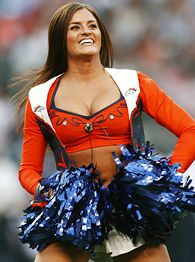
G. Newman Lowrance/Getty Images
Maybe she's the one who called the mystery timeout.
Best Purist Drive: Score tied at 20-20, the Arizona (Caution: May Contain Football-Like Substance) Cardinals took possession at the Seattle 46 with 1:48 remaining. Did the Cards go pass-wacky? Arizona simply ran the ball up the middle four straight times until it reached the Seahawks' 24, from which the Cards kicked the winning field goal as time expired. Seattle had two timeouts but did not use them to preserve clock, Mike Holmgren apparently assuming Arizona was sure to screw up, then the Blue Men Group could win in overtime. Nice play in a lost cause: Early in the third quarter, Arizona led 17-7 and had first down at midfield. Matt Leinart threw deep and was intercepted, triggering Seattle's almost-comeback. Who intercepted Leinart deep? Middle linebacker Lofa Tatupu, who had hustled 30 yards downfield.
Why Tactics Matter: The Packers increased their "line splits" a bit against the Giants, spacing offensive linemen a bit farther apart than they'd been in Green Bay's opener against the Eagles. Wider line splits expose the quarterback to blitzers but also improve "passing lanes" -- the ability of the quarterback to get a clear view of receivers in the flats. It sure worked, as Green Bay scored no offensive touchdowns against the Eagles, then scored five against the Giants. The G-Persons, meanwhile … have you ever seen less emotion on a sideline? As a close game became a blowout, Jersey/A allowing itself to be outscored 21-0 in the fourth quarter at home, Giants players on the sideline sit impassively, staring off into space, practically checking their watches to see how soon they could leave. "We're not going to get any worse, that I can promise," Jersey/A defensive end Osi Omenyiora said reassuringly after the game.
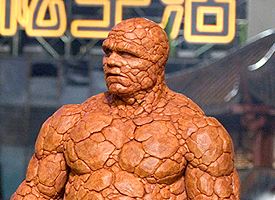
20th Century Fox
Being confronted by a grizzly bear in the Black Forest was nothing compared to the time The Thing was attacked by an alligator in Africa.
Wide Receiver Runaway Ego No. 1: Game scoreless, Dennis Northcutt of Jacksonville caught an 11-yard third-down pass for a first down against Atlanta, then leapt up pointing at the defender and dancing; he was called for a 15-yard taunting penalty, and the Jaguars ended up punting. Why do so many NFL wide receivers get away with considering their stats more important than the team's fortunes?
Wide Receiver Runaway Ego No. 2: Catching a 9-yard pass against the Steelers, Lee Evans of Buffalo leapt up pointing at the defender and dancing; he was called for a 15-yard taunting penalty. Why is this worth remarking upon? At the time Evans jumped up to dance, there were four minutes remaining in the game and Buffalo trailed 26-3. Bills note: Dick Jauron is 43-61 and has just one winning season as a head coach. He looked on impassively as his team got clobbered yet again. Career losing coach who looks on impassively at yet another loss -- what's wrong with this picture?
Wide Receiver Runaway Ego No. 3: Chad Johnson's nonstop on-field and sideline shenanigans at Cleveland -- could that just possibly have had something to do with the Bengals' lack of focus and overconfidence? Why do so many NFL wide receivers get away with considering their stats more important than the team's fortunes?
Linebacker Runaway Ego: Shawne Merriman dropped Tom Brady for loss, then leapt up and did his sack dance. San Diego was behind 17-0 at the time. You don't dance when you're way behind. Not, at least, if you have your head in the game.
Wide Receiver Lack of Ego: Randy Moss has scored three touchdowns this year, and each time handed the ball to the official and walked back to the sideline. Much as we're all now suspicious of New England, this improvement is not based on cheating, it's based on coaching.
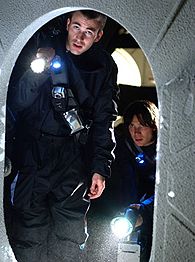
Fox Searchlight
Characters from the movie "Sunshine" search for some science.
But what really drove me nuts about "Sunshine" were the scenes in which an astronaut tends plants in the onboard hothouse that produces all the crew's oxygen. This scene betrays the producers' lack of knowledge of rudimentary science. Plants do make oxygen that mammals breathe, though most atmospheric oxygen comes from marine biology, not land plants. At any rate, huge numbers of land plants would be required to exhale enough oxygen for a single person. This isn't a problem on Earth, where plants outnumber mammals by a spectacular multiple. But on a spaceship, a garden perhaps the size of an urban park -- maybe a plant biologist could calculate this exactly -- would be required to release enough oxygen for eight crew members. The little hothouse depicted in the movie is nowhere near large enough to provide oxygen for the crew. At one point, after a bunch of plants are killed in a contrived scene, two characters fight over one single plant -- one plant would produce maybe enough oxygen for the smallest species of vole. Compressed or chemically generated oxygen would make far more sense for a spaceship than a garden. Please, Hollywood producers, offer us sci-fi movies that rise to the level of 16th-century scientific knowledge.
Until "Sunshine," I thought the screwiest sci-fi movie was the 1972 cult flick "Silent Running." It's the future, and all Earth forests have been destroyed by some environmental calamity. A super-enormous starship is sent into orbit around Saturn bearing a preserve of Earth's last trees. The trees begin dying. In the final reel, the last remaining astronaut realizes -- like, wow, man, they need sunlight, and presses a button that supplies the trees with sunlight. A future society able to build super-enormous starships that can travel to the orbit of Saturn for the purpose of preserving trees would remember to tell the ship's computer that trees need sunlight. "Silent Running" is today remembered mainly for having, as comic relief, cute little meeping droids that George Lucas later shamelessly stole for "Star Wars."
Switch to the Good Games! It's early in the season, and network programmers are not in form. In our nation's capital, the local CBS affiliate aired every sleep-inducing snap of Pittsburgh's 26-3 rout of Buffalo, although CBS could have switched to the red-hot Indianapolis at Tennessee or Cincinnati at Cleveland games, to which it had rights. Over on Fox, the local affiliate stayed with every sleep-inducing snap of Green Bay's 35-13 route of Jersey/A, although Fox could have switched to the hot Niners at Rams comeback, to which it had rights.
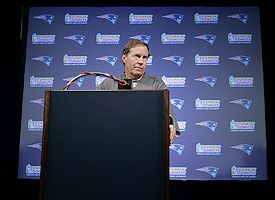
AP Photo/Stephan Savoia
Yesterday Bill Belichick denied owning a mink coat, and said he plans to keep the dog Checkers.
Leftover San Diego Collapse Point: On the second-to-last play of the first half, the Chargers intercepted a Tom Brady pass, and Brady moved into position to attempt the tackle. NFL rules say that a quarterback cannot be hit during a turnover -- this is to prevent free shots against the quarterback -- unless the quarterback enters the action to attempt a tackle. When Brady did, that made him fair game. But none of the four San Diego players near Brady while this was happening came over and popped him. In fact, none of them touched him. That sure wasn't because of New England cheating! That was because the Chargers didn't come ready to play, then gave up the moment things got tough.
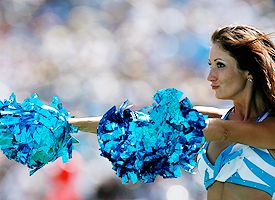
Kevin C. Cox/Getty Images
A powerful argument for warm-weather games.
Obscure College Score of the Week No. 2: Mayville State 10, South Dakota School of Mines & Technology 7 (triple overtime). There were 36 points scored in the three overtimes of the Mercyhurst-Wayne game, three points scored in the three overtimes of the Mayville-S.D. Tech collision. Located in Rapid City, S.D., South Dakota School of Mines and Technology finished second in this year's International Aerial Robotics Competition.
Reader Animadversion: Got a complaint or a deeply held grievance? Write me at TMQ_ESPN@yahoo.com. Include your real name and the name of your hometown, and I might quote you by name unless you instruct me otherwise. Note: Giving your hometown improves your odds of being quoted.
On Wednesday: TMQ readers name the universe!
Next Week: Ideal person for Bill Belichick to confess to: Chuck Colson.
In addition to writing Tuesday Morning Quarterback, Gregg Easterbrook is the author of "The Progress Paradox: How Life Gets Better While People Feel Worse" and other books. He is also a contributing editor for The New Republic, The Atlantic Monthly and The Washington Monthly and is a visiting fellow at the Brookings Institution.

Comments
You must be signed in to post a comment